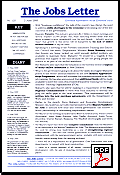



|
 |

|
| No.247 | 24 February 2006 | Essential Information on an Essential Issue |
of key events over the last few weeks. BUY KIWI-MADE CAMPAIGN UNEMPLOYMENT AT 3.6% STATISTICS THAT MATTER WHO GOT HE JOBS EMPLOYERS WELCOME SKILLED MIGRANTS FLEXIBLE WORKING HOURS BILL MANY PRISON WORK SCHEMES AXED NEW FOCUS ON RETAINING WORKERS LATEST YOUTH TRANSITIONS SERVICE NZ ECONOMY 2ND MOST VULNERABLE TO BIRD FLU TURNING WELFARE INTO A WORK SUPPORT  LAST Letter
LAST Letter
NEXT Letter   Download this issue as a PDF file
Index to Features
2 February 2006A website has been launched to help NZ'ers donate surplus goods or services to the community sector. Donate NZ allows donors to "advertise" what they have to give away to the not-for-profit sector. The site is now available to all schools and early childhood centres and will be extended to community groups in within a year. The website can be found here. 3 February 20067,000 more people arrived in NZ for long-term stays than left over the 2005 calendar year. This is significantly down on the 15,100 increase in population due to immigration in 2004. The Child Poverty Action Group (CPAG) supports the campaign against "poverty wages and insecure work hours" which is being funded by fast-food workers and run by SuperSizeMyPay.com. CPAG representative Donna Wynd: "The bottom line is that those who are working should be able to provide for their families. It is not just the workers who are affected, it's their kids." 5 February 2006Poor social skills and widespread negative attitudes towards business among students has led to half of UK chief executives surveyed to expect a shortfall in suitable job candidates over the next year. The study by the Association of Graduate Recruiters also finds many employers are now looking for candidates with "softer skills", such as team working, cultural awareness, leadership and communication skills, to accompany academic achievements. An immigration Bill being debated in the British parliament aims to close the door to low-skilled labour from outside the EU — a move that threatens to close hundreds of Chinese and Indian takeaways businesses. The government says the industry needs to attract more resident UK workers. 6 February 200610 million creative-sector jobs will be added to the US economy in the next decade according to calculations based on US Bureau of Labour Statistics forecasts. And the service sector is expected to provide an additional five million new jobs. However, service sector jobs are paid at only a third of what creative-sector jobs are paid and the Bureau says this could be a dangerous signal that the labour market is cleaving into two economic classes. 7 February 2006BT Financial Group chief economist Chris Caton, says the NZ dollar is likely to weaken substantially by mid year or year's end, but not in time to halt a significant economic slow-down which would be outside the control of the government. 8 February 2006Ordinary salary and wage rates rose 0.8% in the last quarter and 3.1% in the year to December according to the Statistics NZ Labour Cost Index. This is the fastest rise in 13 years. ANZ National Bank chief economist John McDermott says that because of the lag of nearly two years between skill shortages and labour costs, wage pressures were set to linger for some time. 112 jobs will go as Land Information NZ (LINZ) plans to cut its regional processing centres over the next three years. Even though world commodity prices have fallen, returns for NZ primary produce exporters have risen, according to the ANZ World Commodity Price Index. A drop in the value of the NZ dollar has more than compensated for the fall in international commodity prices. NZ primary produce exporters' returns have increased even though world commodity prices have fallen. The value of the NZ dollar has dropped further than world commodity prices — bolstering returns for exporters. About 220,000 students and union workers demonstrate throughout France to demand the government scrap its plan to fight youth unemployment by introducing a new type of job contract. Demonstrators fear the plan will endanger job security. 9 February 2006The NZ government warns Fijians against paying to get a job in a NZ orchard or vineyard. Immigration Minister David Cunliffe says there is no guarantee that people who pay $2,000 to Pooz Travel World would get a temporary work permit. Cunliffe says all applicants need to meet immigration criteria before they are granted a NZ visa. About a third of Maori are business entrepreneurs, according to the Global Entrepreneurship Monitor. And about 25% of Maori, versus 13% of the general population, expect to start-up a business in the next three years. But 37% of Maori entrepreneurial start-ups survive to three and a half years compared to 62% for the general population. Maori Party MP Te Ururoa Flavell calls on the government to offer Maori entrepreneurs more support. Flavell: "We will be asking the government why it is that these world class entrepreneurs are lacking sustainable support to make the risks worthwhile." 50 Chinese and Filipino abattoir slaughtermen are on their way to take up jobs in Warrnambool, Victoria, and another 24 are set to be approved to work in two other towns in the Australian state. But a unions say says employers are using the term "skills shortage" as a cover to import cheap labour. Australasian Meat Industry Employees Union Western District says there isn't a shortage of workers but a shortage of companies that will pay decent wages and conditions that will attract workers to the industry. 10 February 2006The National Party leader Don Brash renews his call to crackdown on welfare dependency. Brash tells the party's caucus the number of people on sickness and invalid benefits continue to rise — and numbers on the domestic purposes benefit remains static. Brash asks party welfare spokesperson Judith Collins to prepare a report on options to cut beneficiary numbers and to push more people into the workforce. NZ has doubled its share of beef exports to Japan and is now second only to Australia in the Japanese beef market. Meat and Wool NZ says growth in beef sales is mainly due to the Japanese government banning US and Canadian beef after the discovery of BSE in North America. Workers at a McDonalds fast food restaurant in Queen St, Auckland, carry out a "symbolic" strike after Unite union members say they were rostered-off a shift after the company had agreed the workers would be paid to go to a union stop-work meeting. 12 February 2006Over 1,000 people attend a rally by the SuperSizeMyPay.com campaign in the Auckland Town Hall. At the rally are MPs Sue Bradford and Pita Sharples and union leaders Carol Beaumont and Laila Harre. 170 jobs are lost as Pacific Pharmaceuticals, one of NZ's largest pharmaceutical producers, is to close its Mt Wellington manufacturing arm. Managing director Margaret Dixon says the company — a major supplier to the government drug agency Pharmac — is closing the facility for "economic reasons". Dixon says a large variety of alternative manufacturing locations are being considered. Up to 20,000 Volkswagen employees in Europe will "be affected" by the auto manufacturer's restructuring programme. Volkswagen has 340,000 employees. 13 February 2006Hawke's Bay apple growers are concerned they won't have enough workers to harvest this season's crop. Horticulture NZ says the Gala apple pick will begin on 25 February and many more workers are needed for the harvest. The Department of Labour has been authorized to allocate 4,000 permits for foreigners to work temporarily in the region's fruit industry. 122 Air NZ cleaners will lose their jobs as the company plans to contract-out their work. Air NZ airport services general manager Paul Reid says the airline will save $1.5 million/yr by contracting out aircraft cabin cleaning work. Reid says the cleaners will be able to transfer to the new cleaning services or take redundancy. Australian bakery franchise Brumby's is hiring 20 Vietnamese bakers. Brumby's managing director Michael Sherlock says the move was a last resort after a two-year recruitment drive failed to attract enough qualified staff. Sherlock: "We are still advertising for apprentices in five states and are desperately looking for qualified Australian bakers. But as a fall back we have turned to overseas staff." 14 February 2006About 100 demonstrators march on parliament to support the Abolition of Age Discrimination Bill that would do away with youth rates. The Labour caucus has agreed to support the referral of the Minimum Wage (Abolition of Age Discrimination) Amendment Bill to a select committee. But Minister of Labour Ruth Dyson says the government makes no commitment to support the Bill through further stages. The number of job vacancy ads declined in the December quarter according to the ANZ survey. ANZ economist John Bolsover says some employers might have put hiring plans on hold as economic growth declined but he suspects some employers have just given up advertising because of the lack of suitable applicants. Changes to business development grants will see fewer but larger grants given out. Minister of Economic Development Trevor Mallard says a change in policy emphasis will mean "it's alright to do some bigger things — as long as they are done in partnership". Mallard says this doesn't signal the end of small-scale grants for domestic businesses. 15 February 200627 staff at Pacific Plastics in Otaki will lose their jobs after fire destroyed their workplace. General manager John Cribb says Work & Income gave two verbal public assurances that they would help the company retain staff while a new factory was being built. But it has subsequently found there is nothing in existing policy which allows them to help. Work & Income Kapiti manager Jacqui Ferrel says no assurances or commitments were given that Pacific Plastics could be helped financially. Ferrel: "We said we could provide support for staff if they were made redundant. Task Force Green was one of the options explored but unfortunately the company does not meet the criteria because it is a commercial operation." Wellington had the most stable workforce in 2004 with an average quarterly worker turnover of 14.9% compared to a national average of 17%, according to Statistics NZ. The Tasman region had the highest average quarterly turnover rate of 23.6% — owing to the large number of seasonal employees. 93% of people who have immigrated to NZ through a Skilled Migrant scheme are satisfied with their life in NZ and 70% are "satisfied" or "very satisfied" with their job. The Department of Labour report Skilled migrants: A study of settlement outcomes can be downloaded (66pg, 492Kb) from here. The Regional Development Board in Murray, a rural district of the Australian state of Victoria, has engaged a recruitment firm that specialises in finding professionals in Australian cities who want to move to a rural area. The board has previously looked overseas to fill local jobs but has now decided to target urban Australians. 16 February 2006 Qantas Airlines says further job losses are inevitable to help compensate for fuel prices, which climbed by 58% in the last half year. 20 February 2006Salaries in the information technology sector continue to rise according to a survey by recruitment agency absoluteIT. Auckland manager Martin Barry: "We expect there will be more pressure regarding filling vacancies this year. The much-predicted economic slowdown isn't having any effect on IT." 21 February 2006Statistics NZ figures show 22,500 more NZ citizens left to live in Australia than returned in 2005. This figure is up 34% on 2004 and is fueling concern about the affect of NZ'ers moving to Australia on the NZ labour market and skills shortage. About 300 jobs will be lost as Air NZ will go ahead with outsourcing its wide-body aircraft heavy maintenance.
 LAST Diary
LAST Diary
NEXT Diary 
|
BUY KIWI-MADE CAMPAIGN The Buy Kiwi-Made campaign is about retaining businesses — and jobs — in New
Zealand. Speaking for the first time as the spokesperson for the government on Buy Kiwi-Made, Green MP
Sue Bradford told an Employers and Manufacturers Association (EMA) workshop in Wanganui
the campaign seeks to encourage the local production of durable, high value products made by
well-trained, well-treated and well-paid workers. The campaign will support the expansion of sectors
which are "sparing in resources but rich in employment". And it is committed to doing everything possible
to decrease New Zealand's dependence on increasingly costly oil and to encourage
sustainable production, manufacturing and consumption patterns. The Buy Kiwi-Made campaign is about retaining businesses — and jobs — in New
Zealand. Speaking for the first time as the spokesperson for the government on Buy Kiwi-Made, Green MP
Sue Bradford told an Employers and Manufacturers Association (EMA) workshop in Wanganui
the campaign seeks to encourage the local production of durable, high value products made by
well-trained, well-treated and well-paid workers. The campaign will support the expansion of sectors
which are "sparing in resources but rich in employment". And it is committed to doing everything possible
to decrease New Zealand's dependence on increasingly costly oil and to encourage
sustainable production, manufacturing and consumption patterns.
The Buy Kiwi-Made campaign is part of the Co-operation Agreement signed by the government and the Green Party after the 2005 election. The goals of the programme are to: — create awareness of the employment, economic, environmental and social benefits of buying locally made products and services — build brand loyalty for New Zealand made products — reduce imports, especially of consumption goods — help to reduce New Zealand's trade deficit — help to increase New Zealand's manufacturing capability — help create employment — help reduce fuel consumption The Co-operation Agreement provides for the implementation of a Buy Kiwi-Made media marketing campaign, an investigation of ways of better distinguishing New Zealand made goods from imports, government leadership through public sector procurement policies, further development of the Industry Capability Network and an audit of New Zealand imports. Bradford: "The political commitment is there to support a Buy Kiwi-Made programme. The question now is, what will be the design of such a programme. It will be through discussion with stakeholders and interest groups that will help the government design an effective programme that will achieve the goals that we have set in the Cooperation Agreement." Source — Speech by Green Party Sue Bradford to eh EMA (Central) in Wanganui, 9 February 2006, "Buy Kiwi-Made".
UNEMPLOYMENT AT 3.6%The number of jobs in the economy actually fell by 1,000 over the quarter, a small decline but the first decline in job numbers since 2002. In 2005 there were 1.5% more jobs (+32,000) added to the economy. This is in contrast to 2004 — a bumper year for jobs — when the number of jobs grew by 4.4%. Minister of Social Development and Employment David Benson-Pope points out that even though job growth slowed last year, the average of the four quarterly unemployment rates for 2005 was 3.7% - better than the 2004 average of 3.9%. By way of contrast, in 1999 the annual average unemployment rate was 6.8%. One concern is the loss of full-time jobs over the last quarter. There were 9,000 fewer full-time jobs — the largest fall in eight years. This is in contrast to recent trends that have seen regular increases in the number of full-time jobs. — Household Labour Force Survey December 2005 , including the Commentary and Technical Notes concerning the revision of the statistics can be found here. — job growth last year was driven by the service sector (24,500 new jobs) and the construction sector (9,300 new jobs) — while the manufacturing sector shed 9,600 jobs — Maori unemployment is at 8.6% — the lowest level since the HLFS began in 1986 — but it is still over three times the European/Pakeha rate — the labour force participation rate dropped but this is still the second highest ever recorded by the HLFS
Source —Household Labour Force Survey December 2005 quarter 9 February 2006, by Statistics NZ; Dominion Post, 10 February 2006, "Part-timers up as full-time jobs decline" by Sue Allen; media release NZ govt David Benson-Pope, 9 February 2006, "Minister: Unemployment remains lowest n OECD"; media release CTU, 9 February 2006, "Employment figures remain positive"; media release DoL, 9 February 2006, "Employment & Unemployment — December 2005"; HLFS December 2006 Commentary; telephone interview with Keemti Subrail-Narayan at Statistics NZ by Jobs Letter editor Dave Owens.EMPLOYERS WELCOME SKILLED MIGRANTSThe survey found that 87% of employers had tried unsuccessfully to hire a New Zealander to do the job they had finally hired an immigrant to do. The occupations of the migrants vary widely but most frequently those who come as a Skilled Migrant are corporate managers or other professionals (24%), teaching professionals (9%), and physical science and engineering associate professionals (9%). Nearly two years after the skilled migrant schemes were initiated, nearly 70% of the immigrants in the survey sample were still working for the same employer. Of those who had left their jobs, nearly half had gone to other jobs in New Zealand.
Source — Media release NZ govt David Cunliffe, 8 February 2006, "Employers impressed by skilled migrants"; media release Immigration NZ, 8 February 2006, "New report show Immigration New Zealand meeting employers needs";
Industries in which skilled migrants are employed in New Zealand:
Source — Department of Labour report Skilled Migrants in New Zealand: a Study of settlement outcomes, February 2006
FLEXIBLE WORKING HOURS BILL Employees with children under age five would gain the right to request reduced, part-time
or flexible hours at work if the Employment Relations (Flexible Working Hours) Amendment Bill
becomes law. Sponsor of the Bill Green Party MP Sue Kedgley says the intention is for mothers,
fathers, guardians and foster parents to have a framework with which to negotiate reduced working hours
that are mutually agreeable to themselves and their employer. Caregivers would be able to apply to
change the hours they work, the times of day they are required to work, apply to work part time,
work compressed hours or to work a 4-day week. Employees with children under age five would gain the right to request reduced, part-time
or flexible hours at work if the Employment Relations (Flexible Working Hours) Amendment Bill
becomes law. Sponsor of the Bill Green Party MP Sue Kedgley says the intention is for mothers,
fathers, guardians and foster parents to have a framework with which to negotiate reduced working hours
that are mutually agreeable to themselves and their employer. Caregivers would be able to apply to
change the hours they work, the times of day they are required to work, apply to work part time,
work compressed hours or to work a 4-day week.
Kedgley says the law is needed to create a workplace that recognises the difficulties working parents can have while trying to juggle full-time work and care for their children. Kedgley says it is no wonder that so many employees with children simply give up the struggle and drop out of the labour market because they can't find ways of combining paid work and the demands of looking after young children. One-in-three mothers don't come back to the workforce after having children, when their children are young. Kedgley: "The Prime Minister announced recently that she wants more women in the paid workforce. Well, making paid work more flexible, enabling parents with children to work more flexibly, or part time, would help achieve this goal."  Waiting for employers to voluntarily allow more flexible working hours is not working for
many workers, according to the Council of Trade Unions. General secretary Carol Beaumont points out
that recent studies have shown that New Zealanders - particularly men with children - work longer hours
that those in other countries. Waiting for employers to voluntarily allow more flexible working hours is not working for
many workers, according to the Council of Trade Unions. General secretary Carol Beaumont points out
that recent studies have shown that New Zealanders - particularly men with children - work longer hours
that those in other countries.
Beaumont says a change in the law would be good for employers. The FWH Bill is based on a British model that was originally opposed by business people there. But Beaumont says most British employers agree it is having a positive effect on workplace relations as well as creating a better motivated workforce and is helping them to retain staff. Some employers even reported increased productivity. Beaumont believes employers will learn to love the law if it comes into force.  Business New Zealand says legislating to create more flexible workplaces would have the
exact opposite effect. Chief executive Phil O'Reilly told the Bill's parliamentary select committee he
is concerned that the legislation would only give employers limited rights to refuse an employee's
request for more flexible workplace hours — and those rights wouldn't allow the employer to deny a request
on the basis it would impact on customers or create additional costs. O'Reilly: "It's simply good
business practice to address employees' needs, but we don't need a law for that. The better alternative is
to provide information to employers and employees about the options available and the fact that
flexibility is often good for business." Business New Zealand says legislating to create more flexible workplaces would have the
exact opposite effect. Chief executive Phil O'Reilly told the Bill's parliamentary select committee he
is concerned that the legislation would only give employers limited rights to refuse an employee's
request for more flexible workplace hours — and those rights wouldn't allow the employer to deny a request
on the basis it would impact on customers or create additional costs. O'Reilly: "It's simply good
business practice to address employees' needs, but we don't need a law for that. The better alternative is
to provide information to employers and employees about the options available and the fact that
flexibility is often good for business."
Source — Dominion Post, 17 February 2006, "`Bosses `will learn to love flexi hours" by NZPA, media release Business NZ, 16 February 2006, "'Flexible workplace' law not needed"; media release NZ Nurses Organisation, 16 February 2006, "Flexible hours essential for caring round clock"; Sue Kedgely's speech to parliament at the first reading of the Employment Relations (Flexible Working Hours) Amendment Bill, 6 April 2005.MANY PRISON WORK SCHEMES AXED Fewer prisoners are now part of the Corrections Inmate Employment scheme than there
were in 2001. In a bid to cut prison costs, horticulture has been abandoned at eight of 12 prisons,
plant nurseries have closed at five prisons, joinery has been stopped at three, light engineering at two
and contract gangs doing forestry and other work has stopped at two prisons. Department of
Corrections chief executive Barry Matthews says culling the work programmes cut the net financial cost of the
work programmes from $8.6 million in 2002 to $3.8 million last year. But in doing so, the number of
prisoners in a work programme dropped from 41% to 31%. Fewer prisoners are now part of the Corrections Inmate Employment scheme than there
were in 2001. In a bid to cut prison costs, horticulture has been abandoned at eight of 12 prisons,
plant nurseries have closed at five prisons, joinery has been stopped at three, light engineering at two
and contract gangs doing forestry and other work has stopped at two prisons. Department of
Corrections chief executive Barry Matthews says culling the work programmes cut the net financial cost of the
work programmes from $8.6 million in 2002 to $3.8 million last year. But in doing so, the number of
prisoners in a work programme dropped from 41% to 31%.
And Prison Fellowship director Kim Workman, who managed the Prison Service from 1989-93, says the policy of running prison work programmes on a commercial basis is wrong. Workman: "This isn't about running a commercial venture. This is about teaching them a work ethic and providing them with constructive activity so they don't delve into drugs and anti-social conduct. And there is a huge therapy in gardening. My experience is that for the men who work in the gardens there is a special element of contact with nature. There is a spiritual element to it. There is the thing of seeing something grow before your eyes rather than doing meaningless work."  Corrections chief Barry Matthews has set a target of getting half the prison inmate
population into a work programme. And some prison managers are keen to bring back vegetable gardens for
internal prison use. Matthews: "It's an issue as to whether we shouldn't get back into at least
growing vegetables for our own consumption. It will be up to individual site managers. If they have
corrections officers that are guarding prisons, the next question is, can those people be used to guard
prisoners outside the wire where there are additional costs involved? Some of the site managers are very keen
to do that." Corrections chief Barry Matthews has set a target of getting half the prison inmate
population into a work programme. And some prison managers are keen to bring back vegetable gardens for
internal prison use. Matthews: "It's an issue as to whether we shouldn't get back into at least
growing vegetables for our own consumption. It will be up to individual site managers. If they have
corrections officers that are guarding prisons, the next question is, can those people be used to guard
prisoners outside the wire where there are additional costs involved? Some of the site managers are very keen
to do that."
Source — New Zealand Herald, 13 February 2006, "`Gardens dug up to cut jail costs" by Simon Collins.
NEW FOCUS ON RETAINING WORKERSWalker says that career progression, providing new challenges, salary levels, training and strong management are all important elements of a retention strategy. He also says it is important to be sure that once an employer has attracted staff based on a description of what it's like to work for them, the description needs to match the reality of the job and the firm. Source — Media release Hays NZ, 14 February 2006, "Employer focus firmly on retention".LATEST YOUTH TRANSITIONS SERVICE A Youth Transitions Service has been launched in the Hutt Valley. The service — aimed at helping young people make a good transition from school into adult life — will provide career training, job seeking advice, information on educational opportunities and customised support for at-risk school leavers. At the launch Minister of Social Development and Employment David Benson-Pope said that young people, rather than being problems to solve, are strong agents for their own positive change and this strengths-based approach is vital to Youth Transitions Services. A Youth Transitions Service has been launched in the Hutt Valley. The service — aimed at helping young people make a good transition from school into adult life — will provide career training, job seeking advice, information on educational opportunities and customised support for at-risk school leavers. At the launch Minister of Social Development and Employment David Benson-Pope said that young people, rather than being problems to solve, are strong agents for their own positive change and this strengths-based approach is vital to Youth Transitions Services.
The Hutt Valley service is the eighth Youth Transition Service to be established. Benson-Pope says one of the reasons the government decided to situate a service in the Hutt was the determination of Mayors Wayne Guppy and David Ogden, the City Council and local groups to do something to help young people in the city. Within three years there is to be total of 14 Youth Transition Services operating around the country. They are part of a $56.9 million government package to get all 15-19 year olds in work, education or training by 2007. Youth Transitions Services are funded by the government and implemented in partnership with the Mayors Taskforce for Jobs. Source – Media release, 21 February 2006, “‘Hutt Youth Transition Service launched”.NZ ECONOMY 2ND MOST VULNERABLE TO BIRD FLUBank of New Zealand chief economist Tony Alexander says the study results are not surprising. Alexander: "A study came out a few weeks ago saying that we would be one of the best off countries in terms of deaths but I've been saying for a long time that we would be one of the hardest hit economically. It makes sense. Tourism is our biggest export earner and that would cease to exist. And people's debt levels are high and they don't have alternative sources of income so the economy would suffer greatly." — Global macroeconomic consequences of pandemic influenza, February 2006, by the Lowy Institute for International Policy, can be downloaded (79pg, 765Kb) from here. Source — The Press, 18 February 2006, "Bird-flu impact on economy in billions" by Anna Claridge
TURNING WELFARE INTO A WORK SUPPORT
Source — Jobs Australia, 17 February 2006, "MDRC report: turning welfare into work support". |